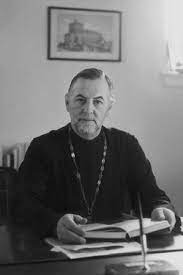
Thirty-eight years ago last Monday, Fr. Alexander Schmemann reposed in the Lord on the feast day of St. Herman of Alaska. His family lost a beloved husband, father, and brother; his Seminary lost a revered teacher, and all the Orthodox world lost something of similarly inestimable value. We lost a much-needed prophetic voice.
Alas, I never got to meet Fr. Alexander in the flesh. Reading his books helped me convert from Anglicanism to Orthodoxy, and later I heard his final series of lectures taped by an appreciative and far-sighted student at St. Vladimir’s Seminary during the last year of his life. But my much desired personal encounter with him never occurred. Just my luck: late for every party. I converted to Christianity in 1970 and so missed writing to C. S. Lewis who died in 1963 by seven years. I converted to Orthodoxy in 1985 and missed going to New York to meet Fr. Alexander by a mere two years. I suppose the lasting lesson is carpe diem.
As the late Fr. Robert Taft once observed while giving a lecture at St. Vladimir’s in honour of their late dean, Fr. Alexander’s books have a tremendously long shelf-life. They are still read, marked, and inwardly digested by generations of Orthodox who never got to meet him, but who were inspired and illumined by his spirit and his teaching. I think the most valuable thing about his teaching is that as an Orthodox he loved the Church and was steeped in its Tradition, and that as a prophet he was able to speak to what was wrong in the Church and call it to fix what was wrong on the basis of that Tradition.
Such a prophetic stance takes courage. The temptation (found especially among us convert types perhaps) is to be so happy to have found Orthodoxy that we defend it against all comers, even at the cost of defending the indefensible. What? Something wrong in the Orthodox Church? Something needs fixing? Never! Heresy! Nothing could ever require fixing in the Orthodox Church! But in fact some things do require fixing, and Fr. Alexander was not slow to point them out. He loved the Church enough and was confident in Christ enough to know that pointing this out was not disloyalty to the Church, but loyalty to Christ and to the truth.
Thus, he fearlessly pointed out the monstrosity of our present North American canonical (or shall we say uncanonical) system of many overlapping ethnic jurisdictions. He pointed out the need for a return to more authentic liturgical practices and a true liturgical piety. He pointed out that there was an underlying spirit of secularism effecting many people, even in the Church. In other words, he combined authentic piety with authentic scholarship, and worshipped God with his head as well as his heart, and called others to do the same. Those frightened of admitting that anything in the Church could require fixing did not appreciate him. Which only revealed how deeply his voice was needed.
Alas, that voice has been still for the past thirty-eight years. But his books and articles remain as timely as ever—perhaps even more so. And we even possess recordings of that voice. One can be found here. As the times become ever darker and more challenging, we need his voice and the truth he proclaimed more than ever.
